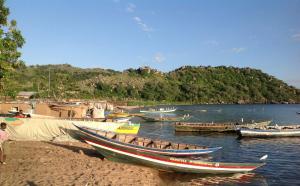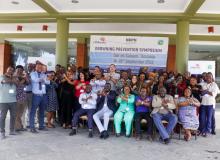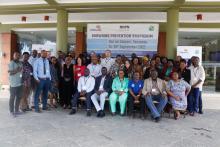Together, we can prevent drowning
Dar es Salaam: Last year, the United Nations passed a resolution on Global Drowning Prevention and the problem is now gaining importance among different sectors in Tanzania and East Africa countries that share the Lake Victoria, the second biggest fresh water lake in the world.
The Tanzania National Drowning Prevention Network (NDPN) and the UK’s Royal National Lifeboat Institution (RNLI) hosted the first Tanzania Drowning Prevention Symposium on 14-15 September 2022.WHO participated in the symposium as the United Nations agency tasked with coordinating efforts to prevent drowning within the UN system and mechanisms for wide range of stakeholders to get involved in prevention of drowning.
“Our work in drowning in East Africa is at the beginning, but it has attracted an increasing number of partners from different sectors. This is a good thing since WHO believes that there is no one single sector that can find a lasting solution to drowning,” said Dr. David Meddings who coordinates the Drowning Prevention Program at WHO headquarters in Geneva.
Drowning prevention is growing in importance in global and national disaster preparedness and response systems as climate change experts project an increase in frequency and severity of flooding. Up to 75% of lives lost in flooding emergencies is due to drowning. The UN resolution on drowning prevention encourages integration of drowning prevention within existing disaster risk reduction programmes, especially in communities at risk of flooding and coastal inundation, including through international, regional and bilateral cooperation.
Led by the NDPN, the symposium drew participants from East African civil society and fisheries livelihoods associations, regional and international academics, regional government representatives and donors and it provided a platform to exchange new research, and key information, skills, and learnings on the issue of drowning in Tanzania.
NDPN is a coalition of civil society partners collaborating to address drowning prevention nationally, through the exchange of knowledge and skills, and by sharing learning on interventions to reduce the drowning burden, whilst working to influence policy action to address the issue more broadly.
Speaking at the opening of the symposium, an official from the Ministry of Livestock and Fisheries said the Ministry is addressing drowning in the context of improving occupational safety for fishermen. “We know that fishermen risk their lives every-day on poor vessels. We are collaborating with partners to improve their safety as part of implementation of the national action of plan on sustainable artisanal fishery sector,” said Grace Kakama, a senior officer from the Ministry of Livestock and Fisheries.
Globally drowning causes more than 236,000 deaths and over 50 percent of the deaths claims lives of person under 30 years old. Most of them drown when they in their daily economic activities, chiefly fishing and transport on water ways. Tanzania has significant drowning rates with 2.2 deaths per 100,000 people. A study of fishing communities on the Tanzanian shores of Lake Victoria found a drowning fatality rate of 217 per 100,000, with 87% of adult deaths occurring while fishing from boats.
WHO has been working to prevent drowning for the past 10 years and have been very active in South East Asia and Pacific. In East African countries, deaths from drowning involve people that are in modes of transport on waterways.
The United Nations resolution on Global Drowning Prevention pointed out the importance of the scale of drowning worldwide and encouraged member states to adopt WHO recommended interventions to prevent drowning. The resolution also proclaimed July 15 every year as the World Drowning Prevention Day.


